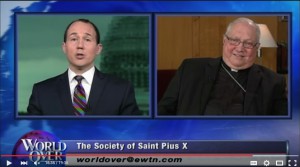

In closing, I want to stress that the need for a reform of the reform is real, and it is underway in our diocese. Morlino was quick to point out two errors with this reasoning:ġ) the Legislator (the Pope) and the bishops with him don't think there is a state of emergency, and 2) the sacraments offered by the SSPX are already widely available at legitimate parishes and chapels, i.e., no one is being denied the sacraments.īishop Morlino ends his message with some practical advice: The SSPX claims that there is a state of emergency, and thus it can offer these sacraments. Marriage and Confession require jurisdiction, which the SSPX does not possess. Two of the sacraments offered by the SSPX on the other hand, are both invalid and illicit. His Excellency notes that while several of the sacraments offered by the SSPX are valid, all of them are illegally celebrated, and so "Catholics should not frequent SSPX chapels or seek sacraments from the priests of the SSPX." He cites pope Benedict's 2009 motu proprio, which states that the SSPX "does not possess a canonical status in the Church" and its ministers "do not legitimately exercise any ministry in the Church." He goes on to lay out reasons, however, why the group remains in material schism. In his statement, Bishop Morlino takes a measured stance, acknowledging the complexities of the situation and clarifying that the SSPX is not "in schism, in the strict sense" - meaning the Church has not formally declared the group to be in schism. Morlino of the diocese of Madison, Wisconsin, has issued a warning about the Society of St.

The SSPX also makes the argument that they have permission because the Church is in a state of “emergency.” However, 1) the Legislator (the Pope) and the bishops with him don’t think there is a state of emergency, and 2) the sacraments offered by the SSPX are already widely available at legitimate parishes and chapels, i.e., no one is being denied the sacraments.You are not signed in as a Premium user we rely on Premium users to support our news reporting. Part of their argument hinges on the faithful erroneously believing that the SSPX priests have the requisite faculty well, if you were in error about that up until now, you are not in error anymore. In certain rare and exceptional cases that might apply to their situation, especially with regard to confession, but for the most part their arguments are not persuasive. The SSPX argues for the validity of their marriages and absolutions based on the canonical principle that the Church supplies the faculty in cases of doubt or common error. If you take nothing else away from this letter, at least hear this - the SSPX’s marriages and absolutions are invalid because their priests lack the necessary faculties. Here's a problem that's important and that I'd never thought of (given that I'm not much of a devotee of the Extraordinary Form, though I support people who love it having it): Great letter to his people from Bishop Morlino about the SSPX.


 0 kommentar(er)
0 kommentar(er)
